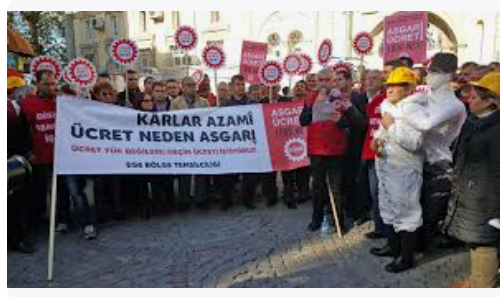Pointing out that Turkey has been stuck in the middle-income trap for many years, Arnold C. Harberger Professor of Economics, Prof. Dr. Ufuk Akçigit of University of Chicago pointed out that the primacy of bringing down inflation obscures micro- and structural impediments to sustainable economic development.
He was interviewed by
Sehriban Kirac. The below are the salient points Akcigit made:
Akcigit emphasizes that while discussing Turkey's inflation problem, we should not ignore the real problems that we should focus on in the long term.
One of the reasons why the private sector does not spend on R&D is the lack of a competitive environment. Our production processes do not include high technology and we cannot train enough technical staff for our companies. In addition, the relationship between universities and the business world is unfortunately almost non-existent.
The proportion of individuals with a master's degree among the working population is decreasing compared to OECD countries. We not only can’t employ policies that will foster competition across the board, but we are also inadequate in training talent that will contribute to productivity in the workplace.
Turkey needs a miracle in the current conjuncture for productivity growth.
If Turkey had maintained the momentum in the economy in 2012, it could have been among the rich countries today. However, as long as productivity-based growth is not achieved, any economic improvement will remain temporary.
The Zero Productivity Problem
One of the most important characteristics of countries which escape the Middle Income Trap is their ability to maintain a stable growth process for many decades. Turkey's growth rate in the last decade has remained only around 3% and productivity growth has dropped to zero in the last ten years.
Akcigit states that we should focus on quality rather than quantity regarding brain drain. For example, the departure of one productive academic is equivalent to the departure of 100 unproductive academics. Most of the academics brought to Turkey from abroad are also unproductive.
While the productivity of an academic who returns to Turkey decreases by 10%, the productivity of an academic who goes abroad increases by 30%. This demonstrates the need to focus on salaries, scientific opportunities and freedom of thought.
The fact that academics at Istanbul University cannot find a travel allowance to attend conferences abroad reveals the lack of resources. It seems very difficult to increase productivity in such an environment.
[embed]https://www.youtube.com/watch?v=-bHByz5KNtQ&t=124shttp://[/embed]
Universities Being Ignored
Akcigit stated: “In our research, we examined how many academics in universities in Turkey publish. The results indicate that many universities publish at almost zero levels. Especially in most universities opened after 2006, if they do publish, the research cannot find a place in quality refereed journals”.
Turkey completely ignores universities when forming its economic policies. However, universities are places where research begins and is developed. As long as the salaries and working conditions of professors are not discussed, we lose sight of the bigger picture.
Appropriate Policy Development
When there is a health problem, it is first necessary to correctly identify the problem and then determine the appropriate treatment methods. Industry 4.0 discussions are also important in this context. The necessary foundations need to be laid and strategies need to be determined to develop technology.
We need to focus on more data and performance-based industrial policies. He emphasizes that we need to separate industrial policies from social welfare policies and support the companies that will create the most value.
“Unfortunately” he concluded, “I see no signs of serious action being taken in this area. These issues need to be addressed urgently for Turkey's economic future”.
Follow our English language YouTube videos @ REAL TURKEY:
https://www.youtube.com/channel/UCKpFJB4GFiNkhmpVZQ_d9Rg
And content at Twitter: @AtillaEng
Facebook: Real Turkey Channel:
https://www.facebook.com/realturkeychannel/
 ufuk akcigit
ufuk akcigit





